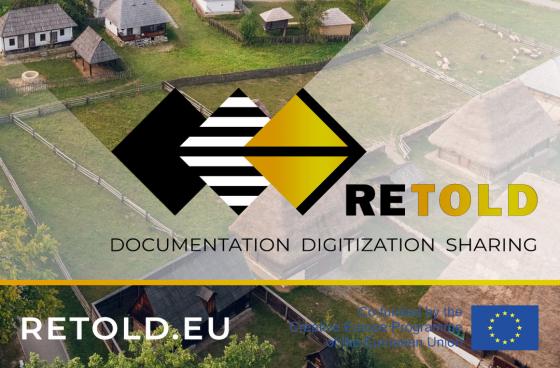
EXARC and the other RETOLD partners (Complexul National Muzeal ASTRA (RO), Museumsdorf Düppel (DE), Nüwa Digital Media Content Production Studios Ltd (IE), Steinzeitpark Dithmarschen (DE) and Universitat Autónoma de Barcelona (ES)) had a very successful online conference at the beginning of October 2021.
Even though we would have loved to meet in person, due to the still ongoing pandemic, we decided to host our first conference online. The plan was to meet at Complexul National Muzeal ASTRA, and we hope to go there in October 2022.

October 4, 2021
The first part of day one was led by Cordula Hansen from Nüwa with an interesting presentation on user research and the feedback given by museums on how they digitalise and document their collections. This is vital information for the development of a documentation app that is part of the RETOLD project. However, for the design, all partners need to understand the needs and demands museums might have of this app. Cordula and Clara (UAB) have been looking into the digital side of things, while the museum partners are providing valid input from a curatorial, archaeological, and ethnographical point of view. During the discussion, it became clear that we want to have an easy-to-use interface that can be easily maintained by museums without the need for an elaborate IT department.
The second part of the first day focused on data entry requirements which Julia (Düppel) has looked at in more detail. The aim is to uniform and standardise the documentation and digitalisation of collections, crafts and houses of open-air and ethnological museums. As a result, this will bring the different types of museums closer together.
October 5, 2021
On the second day, we focussed on a workshop evaluating current digital solutions with the help of a Miro board. We looked at different existing applications that might work for our purpose and if it is possible to integrate our requirements into these apps. The comparison highlighted the different functions of each app, but it also showed their flaws and the obstacles we would need to overcome to use it.
October 6, 2021
The third day started with a presentation from Pau, Clara’s team (UAB), on what app might be working for the visitors of the open-air museums. Whether this is an option for our project, depends on how the documentation app will work but it would be a nice feature to share our work, not only with the scientific world but also with the visitors.
In the afternoon, the project partners split into two breakout sessions. One group (Nüwa, EXARC and UAB) discussed the system and the application in more detail, the second group (the Museum partners and EXARC) planned on how to proceed with the exhibition that is part of the project.
One thought that came up was what is going to happen to the app after the project? We want to develop a long-living documentation app but that means that someone needs to maintain it and be a point of contact in the future.
What will we be doing in the next few months?
We will test the documentation sheets we’ve created and will send them to other open-air and ethnological museums to get further feedback. This will then help us in designing the app and building it for the needs of these types of museums. The results of those tests and how our application will look like will be discussed during the meeting in Barcelona at the end of March next year.
